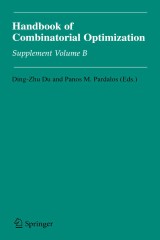Details

Handbook of Combinatorial Optimization
Supplement Volume B|
CHF 177.00 |
|
| Verlag: | Springer |
| Format: | |
| Veröffentl.: | 18.08.2006 |
| ISBN/EAN: | 9780387238302 |
| Sprache: | englisch |
| Anzahl Seiten: | 394 |
Dieses eBook enthält ein Wasserzeichen.
Beschreibungen
Combinatorial (or discrete) optimization is one of the most active fields in the interface of operations research, computer science, and applied ma- ematics. Combinatorial optimization problems arise in various applications, including communications network design, VLSI design, machine vision, a- line crew scheduling, corporate planning, computer-aided design and m- ufacturing, database query design, cellular telephone frequency assignment, constraint directed reasoning, and computational biology. Furthermore, combinatorial optimization problems occur in many diverse areas such as linear and integer programming, graph theory, artificial intelligence, and number theory. All these problems, when formulated mathematically as the minimization or maximization of a certain function defined on some domain, have a commonality of discreteness. Historically, combinatorial optimization starts with linear programming. Linear programming has an entire range of important applications including production planning and distribution, personnel assignment, finance, allo- tion of economic resources, circuit simulation, and control systems. Leonid Kantorovich and Tjalling Koopmans received the Nobel Prize (1975) for their work on the optimal allocation of resources. Two important discov- ies, the ellipsoid method (1979) and interior point approaches (1984) both provide polynomial time algorithms for linear programming. These al- rithms have had a profound effect in combinatorial optimization. Many polynomial-time solvable combinatorial optimization problems are special cases of linear programming (e.g. matching and maximum flow). In ad- tion, linear programming relaxations are often the basis for many appro- mation algorithms for solving NP-hard problems (e.g. dual heuristics).
Data Correcting Algorithms in Combinatorial Optimization.- The Steiner Ratio of Banach-Minkowski spaces - A Survey.- Probabilistic Verification and Non-Approximability.- Steiner Trees in Industry.- Network-based Models and Algorithms in Data Mining and Knowledge Discovery.- The Generalized Assignment Problem and Extensions.- Optimal Rectangular Partitions.- Connected Dominating Set in Sensor Networks and MANETs.
<P>This is a supplementary volume to the major three-volume <EM>Handbook of Combinatorial Optimization</EM> set, as well as the <EM>Supplement Volume A</EM>. It can also be regarded as a stand-alone volume which presents chapters dealing with various aspects of the subject, including optimization problems and algorithmic approaches for discrete problems.</P>
<P>Audience</P>
<P>This handbook is suitable for all those who use combinatorial optimization methods to model and solve problems.</P>
<P>Audience</P>
<P>This handbook is suitable for all those who use combinatorial optimization methods to model and solve problems.</P>
The material presented in this supplement to the 3-volume Handbook of Combinatorial Optimization will be useful for any researcher who uses combinatorial optimization methods to solve problems Includes supplementary material: sn.pub/extras
Diese Produkte könnten Sie auch interessieren:

Linear and Integer Programming vs Linear Integration and Counting

von: Jean-Bernard Lasserre

CHF 118.00

Reactive Search and Intelligent Optimization

von: Roberto Battiti, Mauro Brunato, Franco Mascia

CHF 118.00














